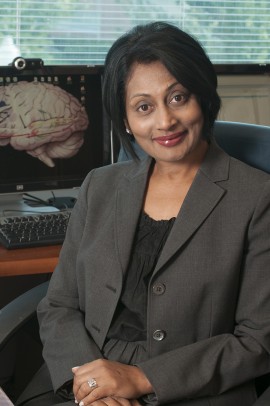University Scholar Mani Pavuluri: for the children

Mani Pavuluri: award “a tribute to the children who inspire me to work on this problem.” Photo: Joshua Clark/UIC Photo Services
The University Scholars Program, now in its 29th year, honors faculty members for superior research and teaching, along with great promise for future achievements. The award provides $10,000 a year for three years.
Patients, families, students and colleagues recognize Mani Pavuluri as a teacher, clinician and scientist, but she’s also admired for her kindness and passion.
In the field of pediatric mood disorders, Pavuluri is recognized both locally and internationally for her research and treatment of children and adolescents.
Her main area of interest is mapping brain circuits involved in emotion regulation and cognitive function in pediatric bipolar disease, a severe developmental disorder that involves behavioral characteristics such as impulsivity, irritability and attention problems.
These children often do poorly in school but they are “good individuals, except they are often misunderstood by peers and teachers alike,” said Pavuluri. “My heart goes out to them.”
She says it’s important to understand what happens in the brain that does not allow children to control themselves, even though they have good intentions.
Bipolar disorder is “the quintessential model to help me understand brain disorders in children because they have emotional problems and cognitive problems intertwined,” said Pavuluri.
She hopes to educate and translate her findings into clinical practice, so care providers and teachers can learn to recognize biological problems that can be remediated with appropriate treatment.
Pavuluri joined UIC in 2000. She developed the Pediatric Mood Disorders Clinic, which draws patients from more than 29 states and Canada, and the Pediatric Brain Research and Intervention Center. She has been the principal investigator or co-investigator on more than 35 grants.
As neuroscience develops and scientists begin to understand that each circuit, or complex network of brain circuits, can disturb function, Pavuluri hopes treatments can be customized for individual, specific problems.
It’s like to trying to fit “a square peg into a round hole,” she said.
One medication cannot address all problems associated with pediatric mood disorders, but combining medication and psychosocial treatment could buffer and support a child’s cognitive and emotional functions, she said.
Pavuluri says the University Scholar award is “a tribute to the children who inspire me to work on this problem.”
“It is a labor of love that could not have been achieved by a single person,” said Pavuluri, who dedicates the award to her clinical and research team.
